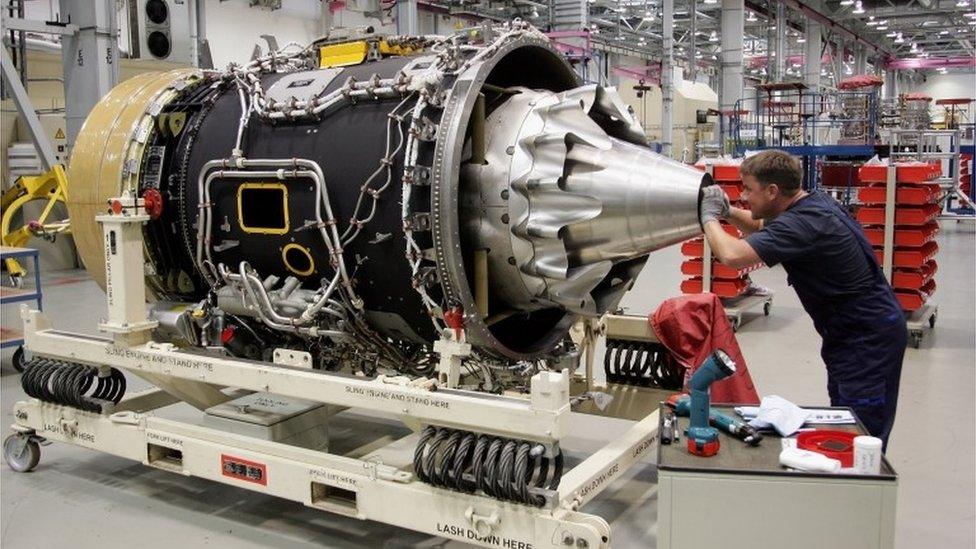Rolls Royce – The good, the bad and the ugly
- Published
- comments

On the face of it, today's results couldn't be more ugly. A reported loss of £4.6bn is the biggest in the company's 133 year history and one of the biggest UK corporate losses of all time. However, while these results are certainly not good, they are not as ugly as they look.
The results are massively distorted by a whopping hit of £4.4bn thanks to an accounting charge which if you bear with me I can explain.
In simple terms, Rolls Royce sells engines and long term service contracts in dollars. Those contracts can last 20 years. The biggest risk for Rolls Royce is that the value of the dollar falls against the pound meaning those long term service revenues are worth less in sterling terms. The company insures itself against that by entering into long term foreign exchange deals to guarantee the revenues don't dwindle. If the dollar falls, it doesn't matter, because the value of your foreign exchange contract - or hedge - goes up as the dollar goes down.
When the opposite happens and the pound falls sharply (as in the 20% fall since the referendum) the paper value of the contract - or hedge - goes down.
The £4.4bn loss is a reflection of many years' worth of contracts being worth less than when they were taken out. Once a year you have to tot all these contracts up and this year the result was a whopping accounting charge. It's worth emphasising that the company has not had to fork out this £4.4bn in real money.
The bad
Taking that charge out, these results are not so much ugly as bad.
Underlying profits, meaning profits that strip out these confusing accounting charges have fallen by a half. That is a fair assessment of the business.
Many of Rolls Royce's older engines are being taken out of service faster than its new engines are being taken up by newer planes. Not only that, but the newer engines will take longer to make a profit as the costs of development, testing and launch overshadow the early years of an engines life.
The real gravy is the money to service them which comes rolling in for many years at little additional cost. With several new engines launched recently those days are some way off.
The good
The good is that orders for these new engines look pretty healthy which bodes well for future profits. The new management team has simplified a sprawling business and costs are lower which will increase future profit margins. Cash flow remains pretty strong which means that the many pension funds that own Rolls Royce shares should continue to receive their dividends.
There is something else distorting these results which really muddies the good bad and ugly waters as it pits ethical, pragmatic and political concerns against each other.
Selling civil aviation, nuclear and military hardware to companies and governments around the world can be a murky business. For decades, palms have been greased, strings pulled and backhanders given.
Rolls Royce was no exception and this year agreed to pay £671m to settle corruption charges which included falsifying accounts, attempting to thwart investigations, and paying tens of millions in bribes to win engine and other deals in Indonesia, Thailand, China and Russia. The charges relate to a 24 year period from 1989 to 2013.
Corruption charges
The settlement is in place of a criminal conviction. A conviction could have meant Rolls Royce being banned from bidding on lucrative government contracts in the US, the UK and Brazil.
According to the judge who allowed this special settlement, Sir Brian Leveson, these were serious breaches of the law, and knowledge of them went right to the top.
He said: "The proceedings reveal the most serious breaches of the criminal law in the areas of bribery and corruption (some of which implicated senior management and, on the face of it, controlling minds of the company)."
Those controlling minds have mostly left the company and may yet have their individual collars felt by the Serious Fraud Office (SFO).
When asked whether former executives would have bonuses from that period clawed back, current chief executive, Warren East, said the board had looked "very hard at that" but the answer was no.
In other words, if we could legally have clawed it back years later - we would have done.
National interest
The judge's decision to allow a financial settlement, as opposed to criminal charges, was based on the co-operation of the current management, the reforms it has made to practices, and the significant damage a successful prosecution would do not only to a world-leading company, and "employees, others innocent of misconduct or what might otherwise be described as the consequences of a conviction".
The judge said that the national interest was "irrelevant" in fending off prosecution but it seems obvious that some of his concerns for the company and its workers overlap with what most would consider in the national interest.
No one is suggesting that £671m is a mere slap on the wrist. In fact, the £497m bit of the fine levied by the SFO is the biggest it has ever imposed and will be considered a feather in its cap.
Others will observe that when it comes to ethics versus jobs and money, jobs and money usually come out on top.
Depending on your own view of the world that is either good, bad or ugly.